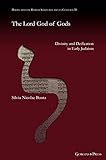The Lord God of Gods : Divinity and Deification in Early Judaism / Silviu Bunta.
Material type: TextSeries: Perspectives on Hebrew Scriptures and its Contexts ; 35Publisher: Piscataway, NJ : Gorgias Press, [2021]Copyright date: ©2021Description: 1 online resource (357 p.)Content type:
TextSeries: Perspectives on Hebrew Scriptures and its Contexts ; 35Publisher: Piscataway, NJ : Gorgias Press, [2021]Copyright date: ©2021Description: 1 online resource (357 p.)Content type: - 9781463243333
- 9781463243340
- 296.3/11 23
- online - DeGruyter
| Item type | Current library | Call number | URL | Status | Notes | Barcode | |
|---|---|---|---|---|---|---|---|
 eBook
eBook
|
Biblioteca "Angelicum" Pont. Univ. S.Tommaso d'Aquino Nuvola online | online - DeGruyter (Browse shelf(Opens below)) | Online access | Not for loan (Accesso limitato) | Accesso per gli utenti autorizzati / Access for authorized users | (dgr)9781463243340 |
Browsing Biblioteca "Angelicum" Pont. Univ. S.Tommaso d'Aquino shelves, Shelving location: Nuvola online Close shelf browser (Hides shelf browser)

|

|

|

|

|

|

|
||
| online - DeGruyter The Quran: Key Word Collocations, vol. 16 : Adjectives, Nouns, Proper Nouns and Verbs / | online - DeGruyter In and Around Maimonides : Original Essays / | online - DeGruyter Konsekration und Konsekrationsgeschehen in der Syrischen eucharistischen Anaphora und in der Liturgie der anderen Mysterien / | online - DeGruyter The Lord God of Gods : Divinity and Deification in Early Judaism / | online - DeGruyter Jacob of Sarug's Homily on Edessa and Jerusalem / | online - DeGruyter The Text of the Gospels in Gregory of Nazianzus / | online - DeGruyter La Şaḥīfa de Médine (VIIe siècle) : Une relecture critique / |
Frontmatter -- TABLE OF CONTENTS -- Acknowledgments -- Chapter One. Introduction -- PART ONE: DIVINITY AND DEIFICATION BEFORE THE EXILE -- Chapter Two. The Biblical Features of Divinity -- Chapter Three. The Ancient Near Eastern Context of Judahite Theologies -- Chapter Four. The Other Gods—Inclusion and Exclusion in the Godhead -- PART TWO: THE EMERGENCE OF THEOMORPHIC ANTHROPOLOGIES AND THE EXCLUSION OF HUMANITY FROM DIVINITY IN THE EXILIC AND PERSIAN PERIOD -- INTRODUCTION -- Chapter Five. Exilic and Postexilic Reassessments of the Divine Presence -- Chapter Six. The Emergence of Theomorphism and the Exclusion of Humanity from the Godhead in Ezekiel 28 and 31 -- Chapter Seven. (Non-)divine “Mediators” and the Angelification of YHWH’s Council -- PART THREE: EZEKIEL THE TRAGEDIAN, DANIEL 2–4, PSEUDO-ORPHEUS, AND THE MERGING OF THE WAYS -- INTRODUCTION -- Chapter Eight. Hellenization and the (Re)definition of Jewishness -- Chapter Nine. The Deified Moses in Ezekiel the Tragedian’s Exagoge -- Chapter Ten. The Deified Daniel in Daniel 2-4 -- Chapter Eleven. Boundaries and Crossings in Pseudo- Orpheus: Moses as a God -- Chapter Twelve. Crossing the Divine Borders in 4Q491c and 4Q427 7 I -- PART FOUR: DEIFICATION IN LATE ANTIQUITY JUDAISM: CONTINUITIES AND DEVELOPMENTS -- INTRODUCTION -- Chapter Thirteen. The Inclusion and Exclusion of Humanity and Angels in the Divine in Rabbinic Judaism -- Chapter Fourteen. Adam and the Kabod -- Chapter Fifteen. Adam-Light Speculations -- Chapter Sixteen. The Enormous Body of Adam -- Chapter Seventeen. Adam’s Body of Knowledge -- Chapter Eighteen. The Angelic Veneration of Adam -- Chapter Nineteen. Conclusions -- Select Bibliography -- Indices
restricted access online access with authorization star
http://purl.org/coar/access_right/c_16ec
The investigation of this book into early Jewish experiences of God begins with calls to discard any categorical and definitional approaches to the literature of early Judaism, and several enduring preconceptions about its mysticism and theology (particularly the relegation of its mysticism to particular texts and themes, and the molding of its theology in the image of medieval and post-medieval Jewish and Christian monotheisms). With this abandonment, the symbolic language of early Jewish texts gives sharper contours to a pre-formal theology, a theology in which God and divinity are more subjects of experience and recognition than of propositions. This clarity leads the investigation to the conclusion that early Judaism is thoroughly mystical and experiences a theology which is neither polytheistic, nor monotheistic, but deificational: there is only one divine selfhood, the divinity of “God,” but he shares his selfhood with “gods,” to varying degrees and always at his discretion. With some important differentiations which are also introduced here, this theology undergirds almost the entirety of early Judaism—the Bible, post-biblical texts, and even classical rabbinic literature. The greatest development over time is only that the boundaries between God and gods become at once clearer and less rigid.
Mode of access: Internet via World Wide Web.
In English.
Description based on online resource; title from PDF title page (publisher's Web site, viewed 01. Dez 2022)


